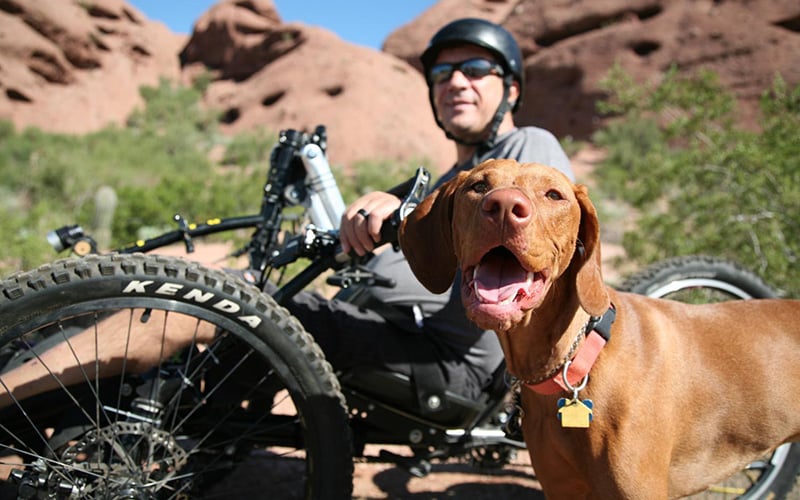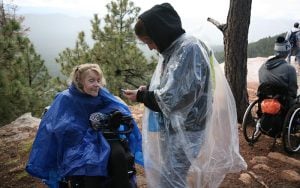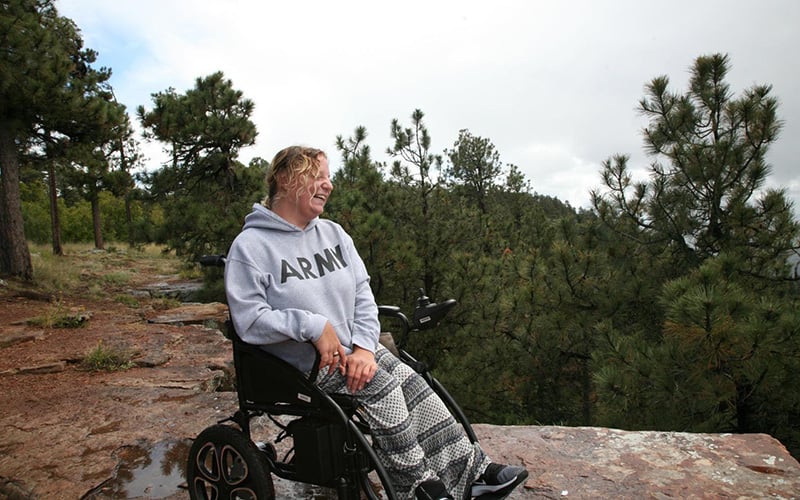PHOENIX – At 22, Carly Verbeke has been to Europe twice. But until just now, she had never been on a hike. Now, for the first time, her wheelchair is rolling past tall pines on a flat, paved trail, the smell of damp earth heavy in the air.
Her chair isn’t even rated to go outside, Verbeke said.
“Apparently, people with disabilities just stay in their house all the time,” she said, laughing. “That’s what we do!”
Verbeke, who was born with cerebral palsy, is among a dispersed pack of wheelchairs rolling along the Mogollon Rim north of Payson. Friends, family and aides are walking alongside, and so are a few people with intellectual and other disabilities.
It took them about three hours on a shuttle to get here, but Verbeke senses how important this is.
“If we’re not able to able to get out here and see it and just reset from the everyday life, then we’re going to go crazy at some point,” she said.
There are programs that get people with disabilities into nature in just about every state.

Loren Worthington, who works with Ability360, gets on his hand bike as often as he can. (Photo by Stina Sieg/KJZZ)
“And people just don’t know about it,” said Loren Worthington, talking from a paved, gently hilly trail at Papago Park in Phoenix.
He’s with the disability advocacy group Ability360, which co-sponsored the Mogollon Rim hike with a group called Daring Adventures and other partners. These trips are cheap for participants — only $15, including transportation and access to equipment.
The idea, Worthington said, is to give people a taste of the outdoors.
Once you love it, “you’ll find a way to just start getting out there more often,” he said.
It happened to Worthington, 54. He has been a paraplegic for more than 30 years, after a baseball accident left his legs paralyzed and his hands partially so.
Worthington had loved sports but put all that aside after the accident.
“I didn’t know I was missing it,” he said. “And then the first time I got on this bike, it’s all I wanted to do.”
He’s in a kind of lounging position, propelling himself by hand pedals, a battery and electric motor assisting him up hills. Since buying his hand bike a few years ago, Worthington said, he’s on it every chance he can get, often with his wife and dogs right alongside.
With a disability, it’s easy to stay indoors, he said, but if you get people outside just once, things can start to change.
“There’s, like, this recall in their brain of what they used to do, or of the one time they went with their high school or something like that,” he said, “and they realize that they just spent four hours without their phone, or without the internet, and it was OK.”
Back at the Mogollon Rim, the hiking group rolled and walked their way to an overlook. As Verbeke stared up at the misty sky and down at the dark-green forest hundreds of feet below, she didn’t stop smiling.
“I would like to do this kind of thing every single day, if I could,” she said.
For her, this is a beginning. For Ralph Sweeden, it’s more of a return.
Wearing a sweatshirt that says “NAVY” and sporting a handlebar mustache, the 74-year-old said he was always the outdoors type before muscular dystrophy attacked his body.
“I thought my life was over,” he said. “I really did.”
But after a few years of depression, he discovered these hikes – and water skiing and kayaking and fishing – the kinds of things offered by Ability360 and similar groups.
“All these activities, they mean so much to me,” he said, smiling.
Sweeden feels his life has opened up.

It’s only the second time Donna Powers, who has been paralyzed from the neck down for more than 30 years, has been on a hike. She’s with her aide, Kayla Westover. (Photo by Stina Sieg/KJZZ)
Donna Powers, 53, feels that way, too. She also felt a cold breeze that cut through her, but being here, close to nature, is part of being a complete person, she said.
“Refreshing, like renewing,” she said.
Powers has been paralyzed from the neck down for three decades. Her life has been pretty full, but this is only her second time hiking.
“My heart and soul are unlimited right now,” she said.
And that’s all from going less than 2 miles down a trail.
“And smelling, and getting wet, and being cold, and then being warm, and then seeing it is such a beautiful view,” she said.
And it’s right in front of her, not in a book or on a screen. Finally.
For more information about outdoor activities for people with disabilities, visit www.ability360.org.
This story is part of Elemental: Covering Sustainability, a multimedia collaboration between Cronkite News, Arizona PBS, KJZZ, KPCC, Rocky Mountain PBS and PBS SoCal.
Connect with us on Facebook.
